Gary Oldman, Or GTFO: 10 Quintessential Gary Oldman Roles
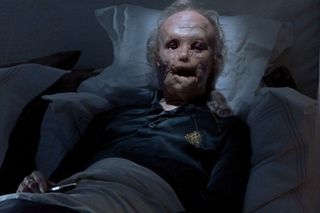
This week, the too-chatty Gary Oldman stars in Dawn Of The Planet of The Apes. It's yet another role for him in a big blockbuster where he's asked to make something out of not much. His family gone, his civilization destroyed, all he has is a rage against his new ape overlords. He brings strength as well as grief to this part, infusing a stock villain character with pathos and a masculine tragedy.
Oldman's been bringing dimension to movies for decades now, however. And despite what he's said in the past, he's really no snob, bouncing back and forth between smaller and bigger films. At this point, the guy's done everything, so when we decided to break his career down into 10 standout performances, we really struggled to weed out the great stuff from the almost-as-great material. We also decided to spice it up with five roles from Oldman's smaller films, and five from his bigger, more well-known efforts.
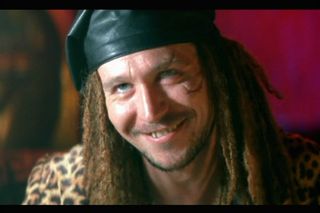
True Romance
Oldman Plays: Drexl Spivey
Why It's Quintessential Oldman: Because Oldman requires just one scene to own an entire movie. Well, fake dreadlocks, a lower baritone to his voice and juicy Quentin Tarantino dialogue is all Gary Oldman needs in his single scene to steal True Romance away from the incredibly colorful cast of characters populating Tony Scott’s black comedy. Oldman plays a Detroit pimp – because, of course – who holds the "rights" to Alabama (Patricia Arquette). He meets his maker early on in the picture, ordered to be assassinated by an Elvis Presley apparition – because, of course. But Oldman somehow casts a long shadow over an ensemble that includes noted scene-stealers Christopher Walken, Dennis Hopper, Brad Pitt and Val Kilmer (playing The King). Hollywood has spent years trying to figure out how best to use Gary Oldman, a versatile British anomaly who seems comfortable in the most uncomfortable of skins. True Romance reminded the industry that trying to pigeonhole Oldman as any particular type is fruitless. He’s good at everything because he can play anything.
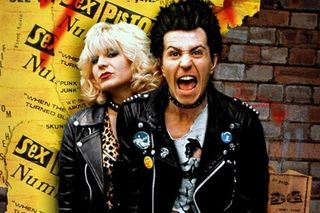
Sid & Nancy
Oldman Plays: Sid Vicious
CINEMABLEND NEWSLETTER
Your Daily Blend of Entertainment News
Why It's Quintessential Oldman: This is an upsetting film, ultimately, a chronicle of a very sick punk rock mind and the co-dependent romance with enabler Nancy Spungen (Chloe Webb) that ultimately engulfed them both. Oldman, it goes without saying, is unrecognizable. This is not the sex of rock and roll, but the depravity. Oldman's Sid absolutely nails the repulsion the original Vicious brought to the stage, but also the innate attraction. When you saw Sid Vicious perform, you were both drawn to him and utterly disgusted. Oldman's performance feels like a loose cable on a street, flickering electric sparks in all directions. It's only going to cause harm to all surrounding it, and the best you can do is keep your distance and witness the carnage from afar. Much has been written about the awful death that closes the film, the incident that ended Vicious' life. Oldman, with the ideal collaborator in director Alex Cox, makes you feel the crushing sadness that arguably did not exist in real life.
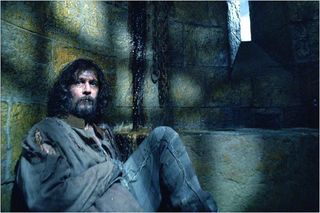
Harry Potter and the Prisoner of Azkaban
Oldman Plays: Sirius Black
Why It's Quintessential Oldman: Because the third Harry Potter movie – still the best Harry Potter movie – proves that adding Gary Oldman to an existing franchise only makes things better. (The premise is proven once again in the recent Dawn of the Planet of the Apes.) Casting Gary Oldman as Harry’s godfather, Sirius Black, was a stroke of genius, as it also taps into a truth we have come to believe about the versatile actor. Much like Sirius, every kind of suspects that the volcanic Oldman is inherently sinister. "Something wicked this way comes," the choir chants about Sirius (and, indirectly, about Oldman). But when you get to know him, you realize he’s approachable, supportive… on our side. Which is right where we want him.
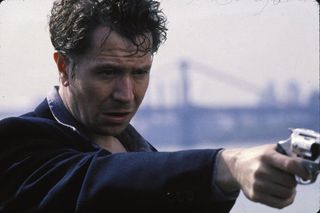
Romeo Is Bleeding
Oldman Plays: Jack Grimaldi
Why It's Quintessential Oldman: This is Oldman in the classic noir role of the dimwit do-gooder, a man who ignores the skeletons in his closet because he's doing the right thing. Interestingly, Oldman, an actor of many shades, registers this character's complete surrender to Mona Dermarkov (Lena Olin, crazy sexy) as almost a neurological shutdown. He's almost literally putty in her hands, and while other actors would have used this opportunity to play dumb, Oldman is instead possessed and flummoxed to how absolutely powerless he is to her charms. And this is a man who is married to Annabella Sciorra and sleeping on the side with Juliette Lewis, circa 1993. For the movie to work, you have to believe that this sexual superman who also successfully navigates the corrupt cops and mob bosses can be completely, spiritually and emotionally defeated by one woman. To her credit, Olin provides that seductive menace. Seeing her and Oldman in this film is like seeing two old lovers tangoing. It's absolutely intoxicating.
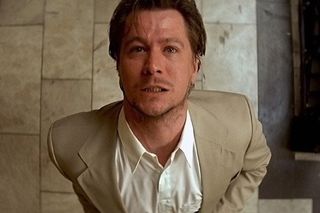
Leon: The Professional
Oldman Plays: Norman Stansfield
Why It's Quintessential Oldman: "EVERYONE!" Norman Stansfield remains one of Gary Oldman’s most memorable, most quotable characters. And it’s interesting how he’s really the opposite side of the coin held by Jim Gordon in Christopher Nolan’s Batman movies. If and when Oldman makes certain choices as an actor, he can convincingly play the straight-arrow, dependable, stalwart arm of the law. At the same time, he’s able to mask that menace and play a corrupt DEA agent like Stansfield. People trust him. People shouldn’t. Luc Besson’s The Professional stands out as one of those rare movies where we like the villain almost as much as we like the hero. Probably because they both occupy this grey area whether neither is wholly detestable. That’s a rare "gift" Gary Oldman brings to virtually every role, and Stansfield might be the best example of the bunch.
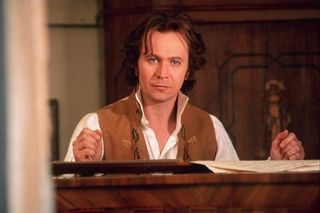
Immortal Beloved
Oldman Plays: Ludwig Van Beethoven
Why It's Quintessential Oldman: Bernard Rose's opulent biopic presents a Beethoven absolutely bonkers and transfixed with the music. Also, he's a lusty sort, though the suave Oldman's choice is to present his Beethoven not as a slick ladies' man, but something of a successful pervert, a rock star performance similar to Side And Nancy. It's a portrait of a tortured man, and Rose's film almost exclusively focuses on the performer as one completely enslaved by the music. This was 1994, the year Tom Hanks' Forrest Gump would sweep the Oscars. Oldman's possessed performance is overwhelmingly powerful, but it was the dark edges that turned people off, and resulted in him being unable to attain his first Academy Award nomination. This wasn't a movie celebrating Beethoven but, with Oldman's contribution, parsing the depths of artistic and sexual madness. It's due for rediscovery (as is the rest of Rose's idiosyncratic filmography), and the hope is that happens soon – this is a film knee-deep in the panicked romanticism of music and the paranoid perversion that lies in the heart of those who make it.
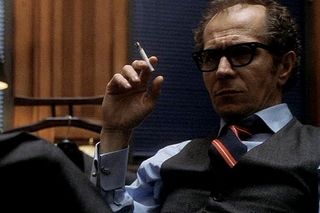
The Contender
Oldman Plays: Congressman Shelley Runyon
Why It's Quintessential Oldman: Yet another case of Oldman taking a straightforward character on the page and bringing him to multidimensional life. Rod Lurie's didactic political drama paints liberals as dignified heroes (including Jeff Bridges as a swinging-dick Clinton-alike) and conservatives as hissable villains. But Oldman's Runyon comes across as sincere in not only his convictions, but the pause in which he recognizes the corrosive elements of his own politics, knowing full well that his actions might assassinate the character of a principled person that just happens to sit on the other side of the aisle. Oldman was later outspoken in his disappointment regarding how the film leans a little too hard left, largely due to the nuance of his performance. Which isn't a surprise: ultimately, Oscar nominations went to Bridges and the film's lead Joan Allen, the two primary liberal characters in the film. Oldman's protests, made in casual conversation, suggest that there may be an even richer turn from the chameleonic actor sitting out there, waiting to be edited.

Hannibal
Oldman Plays: Mason Verger
Why It's Quintessential Oldman: Hoo boy, this one is strange, even by Gary Oldman’s standards. It’s not easy to steal scenes away from a larger-than-life, scenery-chewing Anthony Hopkins – particularly with Hopkins stepping back into his signature role. But Oldman outperforms Sir Anthony as Mason Verger, a former victim of Dr. Hannibal Lecter who (get this) peeled off layers of his own face and FED THE PIECES TO HIS DOG. Except for his nose. That piece, he ate himself, thanks to some drug-induced psychological manipulation cooked up by Dr. Lecter. Knowing that he’d need some assistance to outdo Hopkins, Oldman hides under prosthetics in Hannibal, somehow figuring out – masterfully – how to be expressive, tormented and terrifying without the use of facial expressions (or a face). If Silence of the Lambs introduced the world to a new nightmare in Lecter, Hannibal plunged us down unexpectedly dark corridors, thanks to Gary Oldman’s unshackled, fearless turn as one of Lecter’s most disturbing adversaries.
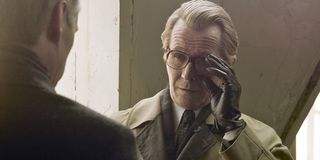
Tinker, Tailor, Soldier, Spy
Oldman Plays: Retired intelligence agent George Smiley
Why It's Quintessential Oldman: Oldman's first and improbably only Oscar nomination ironically comes from one of his most understated turns. Smiley is poker-faced for most of the film, as the picture's cloak-and-daggery skullduggery threatens to swallow the rest of the cast's paranoid, angered spies. In a film perfectly calibrated to be as low temperature as possible, Oldman is ultimately the most cold-blooded of all of them. In the film's earliest scenes, Smiley is depicted as someone who knows far less than he should, a silent dummy meant to provide ambiance to the room. It's no wonder Oldman didn't actually win the award, as he doesn't have that big "Oscar scene" to show on television, that highlight reel snippet that brings it all home. Instead, Oldman lingers in the background, his silence soon morphing into wily perception, into flat-out Machiavellian. It's gorgeous work, like a craftsman laying down the floorboards for the world's most cavernous hallway. The moment when Smiley has delivered his final blow, the viewer is like Agent Kujan at the end of The Usual Suspects, completely overwhelmed by how many clues Oldman has left.
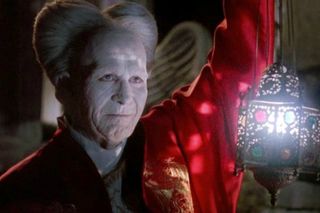
Bram Stoker’s Dracula
Oldman Plays: Count Dracula
Why It's Quintessential Oldman: There are so many Gary Oldman performances we could have slotted here -- should have slotted here. But Francis Ford Coppola gave Oldman something that too few dared try: a leading man’s role. It’s not his only one (as you read about in tinker Tailor Soldier Spy), but it is his most interesting one, forcing Oldman to cheat life, death and time as the cursed Count Dracula, history’s most infamous brokenhearted lover. We picked Gary Oldman’s work in Dracula as an example of his finest parts because of the amount of screen Oldman is able to fill when he realizes the rest of his cast gives him nothing (hello, Keanu Reeves). Dracula also demonstrates how often Oldman is able to rise to the garish theatricality of his surroundings, deliberately playing to the histrionic Gothic nature of Coppola’s scenery and costuming so that they can’t distract from what he’s trying to do. Also, Dracula proves that even in a bad movie, Gary Oldman can be – and often is – great. And for that, we treasure his presence in our film community.
Most Popular






